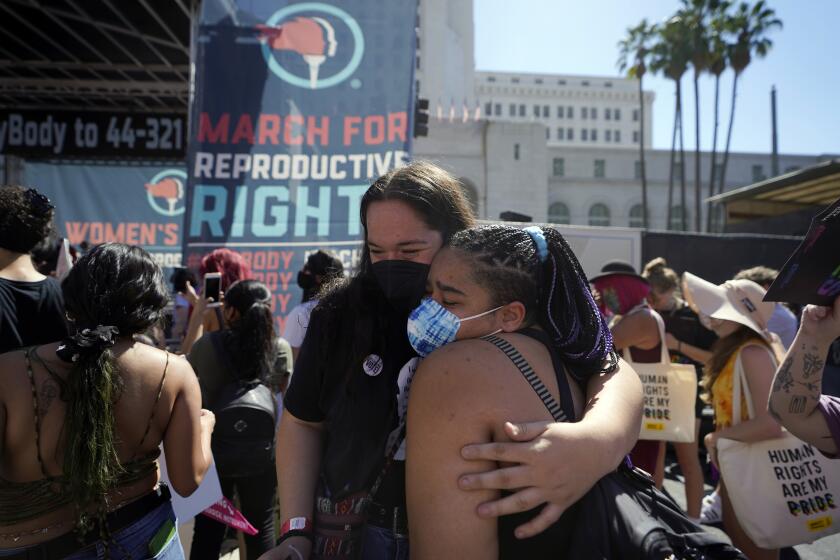Abortion restrictions widely punish military women

- Share via
As the Supreme Court considers the constitutionality of an abortion ban and challenge to Roe vs. Wade, restrictions enacted in Texas and proposed elsewhere uniquely oppress military women.
Active-duty servicewomen experience higher rates of unintended pregnancy than the general population for various reasons. Military members’ medical care during training is often lacking, and their frequent change of providers interrupts their continuity of care. Military healthcare providers often fail to educate servicewomen on different available contraceptives and processes to obtain them, both of which can vary among clinics.
And servicewomen report difficulties developing trusting relationships with higher-ranking medical providers, which undermines their comfort in speaking candidly about their reproductive needs. Servicewomen also experience high rates of sexual assault, with about 1 in 3 female veterans reporting military sexual trauma during their careers.
The Supreme Court’s decision in the SB 8 case could restore abortion rights in Texas. But that’s not why it will be one for the books.
For these reasons, active-duty women need good access to abortion services. Instead, their access is limited by the Hyde Amendment and other laws prohibiting federal funding for abortions except when a women’s life is threatened by the pregnancy and in some instances involving rape and incest. These laws affect women insured by Medicaid and other federal programs including the military’s insurance program, Tricare, which covers 1.4 million military, veteran and military-dependent women of childbearing age. To obtain an abortion, these women typically have to locate a provider and pay out of pocket.
On top of public funding restrictions, military treatment facilities are prohibited from performing abortions, even if servicewomen pay for them out of pocket. The only exceptions are cases of rape or incest, or if the pregnancy is determined to endanger the woman’s life. For military women stationed in countries where most abortions are illegal, such as Iraq, Afghanistan and Djibouti, the lack of care on U.S. bases means they have virtually no access to safe, legal abortions.
Now additional military women are losing access to abortion at home. More than 120,000 active-duty members live in Texas — the third-highest active-duty population in any state. This translates to more than 20,000 active-duty women (16.9% of the force) ordered to serve in a state restricting their constitutionally protected right.
Just as in the civilian population, restricting abortion access for military personnel doesn’t eliminate the procedure — it drives people toward unsafe alternatives. Some servicewomen stationed overseas in countries where abortion is illegal have considered unsafe methods to terminate their pregnancies. They’ve cited the lack of confidentiality in the military, limited financial resources, travel restrictions and fear of military reprimand for severely limiting their options. Those who sought care in military facilities, only to learn of these barriers, are left feeling abandoned.
Active-duty women are placed in a terrible bind; most have to rely on civilian clinics for abortions. But the 20,000 women serving in Texas were stripped of even that option when the state ban on abortions after six weeks of pregnancy took effect Sept. 1.
As some states continue to outlaw abortion, places like California will have to pick up the slack.
For military women, out-of-state options are limited too. Members in training are often prohibited from traveling outside of designated local areas, let alone out of state. These trainees largely fall into the demographic categories at highest risk for unintended pregnancy among service members: under age 25, single, living in barracks and enlisted. Non-trainee members can also have their travel restricted, as COVID-related Department of Defense travel bans applied to most members during the pandemic. And under the Texas ban, anyone helping a women travel out of state for an abortion could be subject to “aiding and abetting” lawsuits.
Servicewomen forced to carry unwanted pregnancies to term face heavy burdens. Low-ranking members’ pay can be insufficient to support a family, and the military can deny requests to obtain outside employment that would supplement their income.
Pregnancy or abortion can severely limit or even end military careers. Women who are pregnant or injured by unsafe terminations cannot deploy to serve military missions abroad. Additionally, unmarried and dual-military married parents are required to designate a caregiver for their children during military absences. If they can’t, they face disciplinary action and/or discharge from the military.
Such turnover is costly for the military: Women who leave the service must be replaced, incurring recruiting and training costs. And because uniformed leaders must come from the ranks, this turnover affects women’s future representation in leadership positions. Women interested in joining the military may also be deterred by having to serve in states that deny their reproductive rights.
If the U.S. wants to be a true standard bearer for personal freedoms around the world, it needs to stop blocking abortion access. Those limitations conflict with our nation’s values — and disproportionately affect service members defending those values. Federal leaders, courts and legislators should defend the right to abortion, undo extreme state restrictions and enact legislation to enable federal funding for all constitutionally protected abortions.
Erika King is an active-duty Air Force officer whose personal research focuses on policies and practices impacting servicewomen’s wellness and retention. The views expressed here are the author’s and do not represent the Department of Defense or United States Air Force.
More to Read
A cure for the common opinion
Get thought-provoking perspectives with our weekly newsletter.
You may occasionally receive promotional content from the Los Angeles Times.








